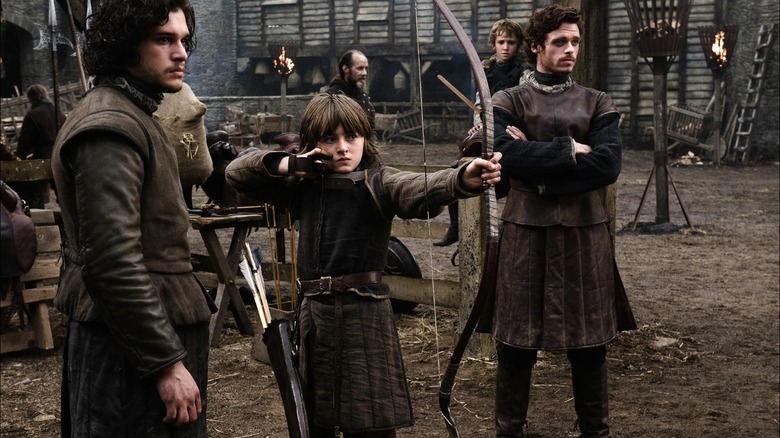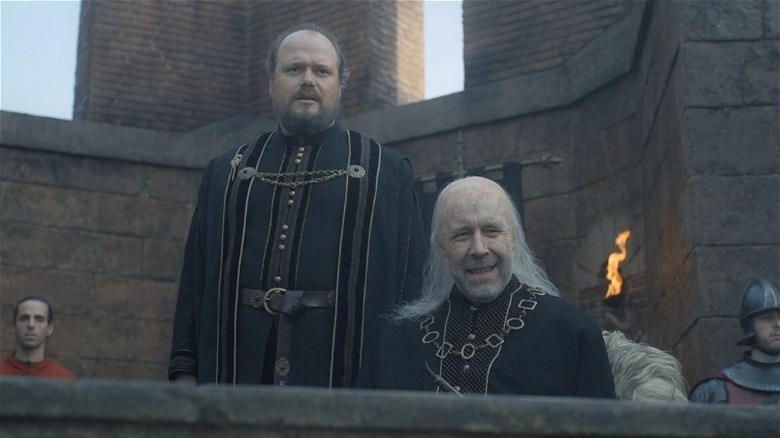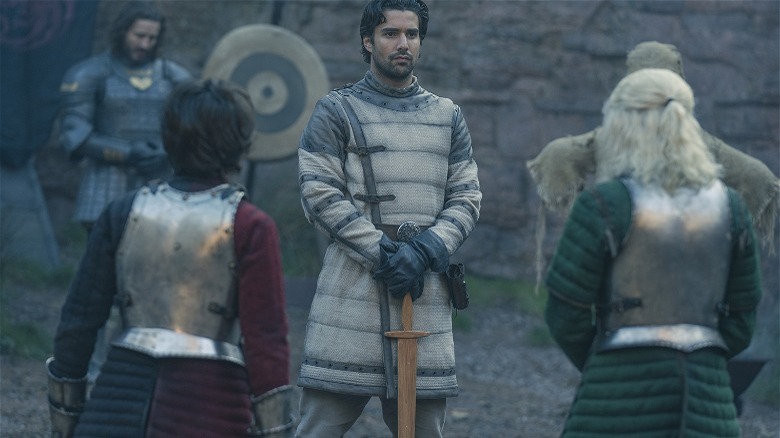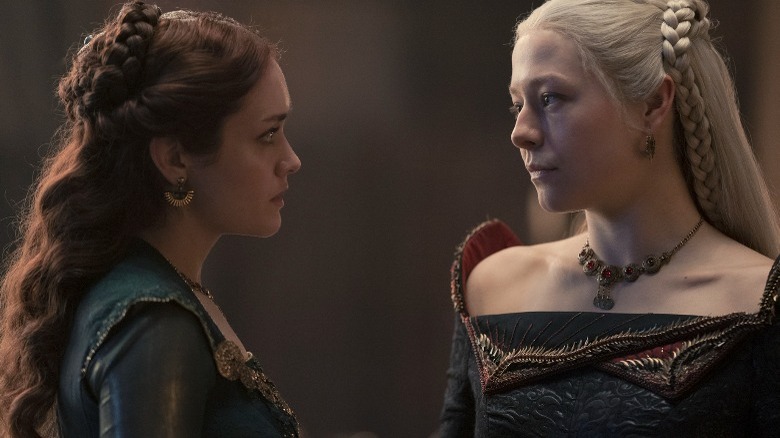How House Of The Dragon Darkly Inverts A Classic Game Of Thrones Scene
This post contains spoilers for episode six of "House of the Dragon."
The latest episode of "House of the Dragon" takes place after a 10-year time jump, meaning that several characters have aged up and are currently embroiled in tense familial dynamics and Westerosi politicking. The episode opens with Rhaenyra (Emma D'Arcy) experiencing an intensely painful childbirth and giving birth to a third child, whom Alicent (Olivia Cooke) wants to see immediately after he's born. Things are already off to a rocky start, and the gestating resentment between the queen and the princess is on full display here. From here on, events take a progressively sinister turn; there are some major character deaths, courtesy of tragic circumstances and covert political scheming.
The 10-year time jump helps cement the microcosmic details of the frayed dynamics in House Targaryen, as generational resentment and trauma take center stage in this episode. Viserys (Paddy Considine) isn't looking too good (the poor man has been having the Worst Time™ since forever), and he is doing his best to disregard the truth about his grandchildren's parentage to keep the peace. This obviously irks Alicent, whose allies include an embittered Ser Criston (Fabien Frankel) and the duplicitous, Little Finger-esque Larys Strong (Matthew Needham).
The similarities between the familial dynamics in "House of the Dragon" and "Games of Thrones" are limited, as the latter explores various houses while the former is strictly focused on House Targaryen. However, a particular scene in the latest "House of the Dragon" episode is a tragic inversion of a similar scene in season 1 of "Game of Thrones," one that involves a family patriarch watching his kids spar during training. However, the scenes are tinted differently in terms of tone, themes, and implications, revealing key contrasts between House Stark and House Targaryen.
Active involvement versus passive observation
In the "Game of Thrones" pilot episode, "Winter is Coming," Ned (Sean Bean) and Catelyn Stark (Michelle Fairley) look on as Bran (Isaac Hempstead Wright) practices archery. Bran is understandably intimidated, as he is aware that his father is watching, and is reminded of the same by Jon (Kit Harrington). After Bran misses his mark many times, his brothers jest and tease him, but Ned intervenes and says that none of them were marksmen at the age of 10. Instead of rebuking Bran, he encourages him, and the Stark brothers mirror their father's gesture soon after.
This scene is our first introduction to House Stark, who come across as a strong, loving family unit, as reflected in this brief scene. Of course, things are not picture-perfect, as there are hints of strained relationships (Cat's resentment towards Jon, Arya and Sansa's sibling rivalry, etc), but it's clear that the Starks will have each other's backs when it counts. Moreover, Ned, the family patriarch, is firm yet gentle in the way he oversees his children, willing to nudge them in the right direction when the occasion demands.
In an inverse parallel in "House of the Dragon," we see Viserys looking on as his children and grandkids train, with Ser Cole taking on training duties. The jilted knight is clearly partial towards Alicent's sons, and unfairly pits the older Aegon against Rhaenyra's firstborn, Jacaerys. There's tension between Alicent and Rhaenyra's children, vented out during the sparring session, and Cole's biased attitude surely does not help matters. Although Viserys witnesses the widening gulf between the kids, he says and does nothing, even after a courtyard spectacle occurs when Ser Harwin punches Cole after being instigated by the latter. This reveals a lot about House Targaryen's broken familial dynamics.
The seeds of resentment have already been sown
Earlier in the episode, we see Aegon and Rhaenyra's children pick on Aemond, for which Alicent aggressively reprimands her firstborn. "You're the king's firstborn son," she reminds him, while encouraging him to partake in the same resentment she holds for Rhaenyra's children. Although Aegon is initially indifferent about his claim as rightful heir to the throne, Alicent's words are enough to create a schism in his heart, and it manifests in the sparring scene. Egged on by Cole's unjust behavior towards Jacaerys, Aemond unleashes his rage towards the younger child, despite knowing that he will be the clear victor in the swordfight, given his age and experience.
Although Ser Harwin intervenes and calls out Cole's cruelty, the knight of the Kingsguard is allowed to sow further seeds of division unchecked. It is truly ironic how Viserys tells his Hand that the kids training together would lead them to form "lifelong bonds" moments before the spectacle occurs — it is also an ironic foreshadowing of the events that will lead to the downfall of the Targaryen dynasty due to familial in-fighting.
Both Viserys and Alicent do not win any points for good parenting; one is passive and deliberately oblivious to the increasing schisms, while the other is actively passing on her bitterness to her children. Moreover, there are folks like Ser Cole who benefit from this divide, especially in light of the rumors about Rhaenyra's affair with Harwin, which can de-legitimize Jacaery's claim to the throne. The circumstances are also ripe for those who wish to orchestrate chaos for unforeseen reasons, such as Larys, who sanctions cold-blooded murder to appease the queen (although she never wished for it). Thus, deadly machinations (both internal and external) to divide the house are already afoot.
'The lone wolf dies, but the pack survives'
"When the snows fall and the white winds blow, the lone wolf dies but the pack survives." These words act as the guiding principle for House Stark, spoken by Ned to Arya in "Game of Thrones." While the winter metaphor has many layers in the context of the show, the overarching message is that the Starks will remain undefeated as a united front, especially during trying times. There are several instances in which the Starks were at odds with one another, but their mutual love and respect helped steer events in their favor, as evidenced by the events that followed Jon and Sansa's emotional reunion. There's a reason why House Stark is so well-loved by fans of the show: the opening scene mentioned above cements their integrity and loyalty towards one another, which, in the end, emerges stronger in spite of their differences.
In contrast, House Targaryen is as divided and fragmented as it gets. Despite temporary truces and alliances, and feelings of apparent solidarity, the major players in the Targaryen family are primarily lone wolves. For instance, Daemon (Matt Smith) is a wild card who can switch up his ambitions as and when it suits him, which makes him a formidable presence worth looking out for. Meanwhile, Alicent is playing the long game while making her intentions crystal clear, which is manifesting in the clear divide between various factions. While Rhaenyra is yet to make a move, she already feels alone due to Laenor's interest in adventure/merrymaking, with rumors haunting her wherever she goes. Finally, with Viserys on the brink of death, and the children prepped to strike their kin, House Targaryen is headed towards imminent doom.



